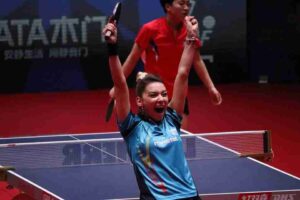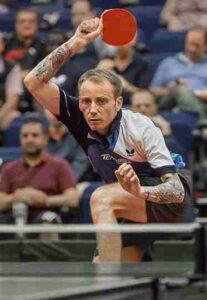Many TT players fail because of one thing Table Tennis Fear. We all face that restricted feeling to perform in pressurised situations. I constantly hear players saying I did not perform or I beat him/her always in practice, but lost or lose in tournaments?!
First Bike Ride
I took my son out on his bicycle, he has been riding for about 3 weeks now but today he fell off (properly). He, unfortunately, cut his hand slightly and to be fair to him he did not cry and got back on his bike. I saw an instant change in body language and FEAR kicked in with signs of confidence loss. He was much more cautious and his stability and speed dramatically decreased which was followed by continuous falls. I believe the other falls were due to fear and on the last fall, he burst into tears. I did my best to encourage him by explaining that falling was a good thing and the more you fall the better you will be. Today he won’t fully understand me but in time as long as he continues he will ride his bike effortlessly.

Time can develop a fear
When we first start playing table tennis (beginner stage) we are fearless; learning by watching others and experimenting with our shots. Nine times out of ten we progress quickly and once we reach a certain level we are told we have the potential to compete and once again we learn by playing, watching and unleashing shots without fear. We progress rapidly and our level and rankings increase alongside some local and possibly national titles. We enjoy our development up until boom FEAR kicks in!
Table Tennis Fear kicks in
Fear kicks in, generally when we rich a higher level and obtain a club or personal coach alongside a supporting family. The coach tells us how we should play instead of guiding and nurturing our natural ability and our family have expectations.
Initially, we played because we enjoyed the game and saw progress due to fearlessness but now we think ahead! Once a player has been told not to do something or that’s wrong and his/her family expect them to achieve certain things, that player develops internal fear. The fear is caused because the player thinks, “if I make a mistake or don’t fulfil my internal and externals expectation I have failed”.
Everyone handles their table tennis fear differently
A small number of players know how to handle fear and thrive under pressure for example (Michael Jordan, Tiger Woods, Rodger Federer, Mohamed Ali, to name but a few). I have worked with many players ranked top 5 and a few no.1’s. I found those who were top five were, in general, the ones who struggled the most under pressure and ultimately did not pursue their careers to its fullest potential. Working with no.1’s I found that they possessed the same fear but faced it differently.
Mr No.1, loved the challenge and was fearless, he did not have family support but I was considered as family and coach. I spoke to my former student a few weeks back about how he handled fear and he said, I was fearless because you supported me regardless of whether I won or lost. He felt that no matter the result I would be proud of him and this gave my player the confidence to perform under pressure, as long as he gave it 100%. When he suffered unexpected losses it was not due to fear, it was lack of preparation, tiredness, or in a process of transition but never due to fear!
How to handle your table tennis fear
1. Remember why you play TT for the love and joy! you and your surroundings have developed those fears mainly due external factors and self success. Make sure your coach works with you and not against you, meaning he guides you and supports you regardless. Guiding means showing you how to improve and never saying a shot is wrong and “you must do it like this”. There is no wrong shot! ‘I often say to my players why did you not open up that half long ball? They reply what does it matter I won the point!! I explain yes you did and well done! but try to look at the bigger picture you may have won it on this occasion but if you faced world no.1 you most likely would have lost that point using that shot. That does not mean your shot was wrong I just want you to think about the shot selection you made. If you chose to push that’s fine just think about the consequences and who your facing (That’s guiding a player.) So try to guide yourself into executing the right shot and producing a positive shot rather than thinking or being told something is wrong and it must be done in a certain way!!!
2. Fear is in general thinking ahead, “if I play a wrong shot, or if I lose this point or match” those thoughts create automatic fear and we often produce those negative thoughts in reality. Try to stay tuned in the ‘NOW’ meaning what is currently happening and forget about the future because it has not happened yet!
3. Face your fear: I like to put money or a drink when I play in the practice hall not because I’m a betting man (I don’t know what a betting shop looks like) but I like to bet on myself because I want to face my fears and learn to perform under pressure. When I competed I would challenge myself to open up on my backhand (my weaker wing at the time) at pressurised situations. Today I have no fear, opening up on my backhand side at any point of a match. I have created reassurance within myself and you can do the same if your willing. I challenge you to open up with your weaker wing under a pressurised situation, e.g your coach says ten pound right now 1 chance, you serve I push to your backhand, if you miss you pay me £10 if you get it on I give you £1.
Facing your fear at crucial times
I will never forget coaching at the national championship, one of my players (was in the final). I called a timeout 9-10 down in the fifth. I said, he is serving half long backspin to your backhand, your pushing and he opens up and in general wins the point. I said, it’s your choice push and risk losing the match or open up and risk winning the match (pay attention to the words I used) both are a risk but one is positive the other negative. My player (Mr fearless, mentioned above) opened up and won the point, he won the next point on his serve and the next point again by opening up with the backhand. He became national champion U12 and U13 that year. I provided fear by asking him to do something he felt uncomfortable but I gave him the choice to face the fear or not.
Taking a positive stance can make you or break you
He went on to become England no.1 after that event for his age and the year above and maintained that position for 3 years ultimately retiring at 15 years of age. I believe due to FEAR!!! at 15 he went to France to pursue his table tennis career, constantly told his shot selection was wrong and attitude is wrong by the club coach. Furthermore, he lost to various players in and around his age group which he had not experienced in
England and he lost me as his guide and support. All these factors produced internal fear subconsciously which may have changed his initial belief in himself?!
The best handle control their fear
Jan-Ove Waldner was the best table tennis player I have ever seen under pressure producing shots that 99% of people would say “is he mad doing that at this point!!” he learnt to block out all the negatives and play fearlessly when others froze due to the magnitude of an occasion or situation
*If you learn to face your fear you will realise that it can be conquered and controlled but if you keep hiding from it you will never be able to control it










